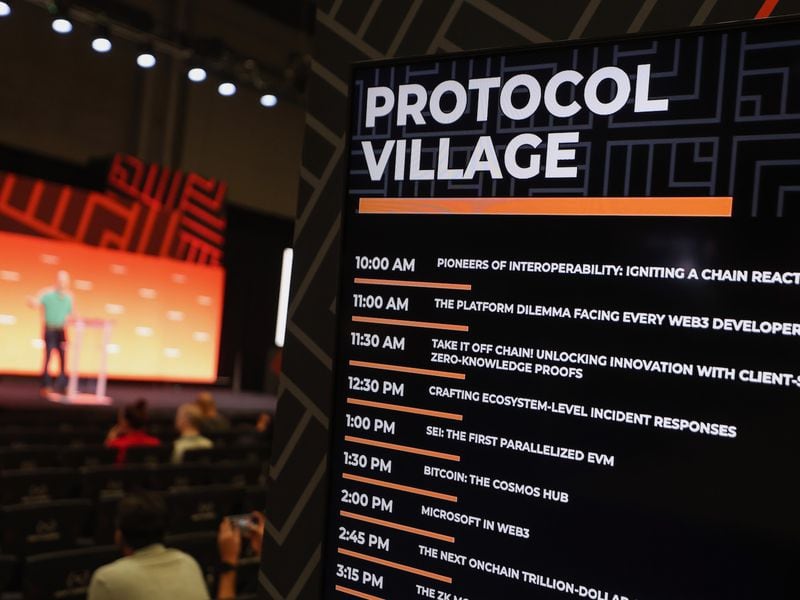Livepeer, a decentralized video-streaming project, powered a livestream for the Burning Man webcast team at the recently concluded event in the Nevada desert. According to the team, the project offered “a more reliable and cost-effective solution than traditional cloud providers. By using Livepeer Studio’s decentralized video infrastructure, they were able to deliver seamless coverage of the event to a global audience. This decision not only reduced streaming costs but also ensured that viewers experienced the iconic festival with no interruptions.” Matthew Reyes, who first ran the webcam in 2013, conducted a fundraiser to collect $8,000 to pay for the new stream, asking Instagram followers to chip in via Venmo or Cash App, SFGate reported. Livepeer co-founder Eric Tang posted about it on X:
Euler, a DeFi lending protocol that suffered a $200 million-plus exploit in 2023, says it has reemerged with the launch of Euler v2, “a meta-lending protocol that enables unlimited use cases for on-chain credit.” According to the team, “the protocol will allow builders to create highly customizable borrowing and lending vaults that can be permissioned or permissionless. As decentralized finance continues to gain traction and more users seek out secure and efficient ways to manage credit on-chain, Euler v2 will play a pivotal role in scaling the crypto lending market, pushing it towards becoming a core component of the global financial system.” As reported by CoinDesk in February, the project held a code audit competition earlier this year to vet the new version.
Celestia, the modular data availability project, introduced its new roadmap. According to the team: “After several years of development, Celestia Mainnet Beta went live last year. Since then, an early ecosystem has taken form, with developers deploying the first 20 rollups and publishing nearly 75 GB of data. The core devs are preparing the first major upgrades, starting with Lemongrass, and now present a technical roadmap with contributions from multiple teams. The community’s roadmap has a core objective: relentlessly scale to 1 GB blocks.” (TIA)
Xalts, a provider of blockchain infrastructure for financial services and backed by Citi Ventures, has partnered with the Tezos Foundation to accelerate the tokenization of real-world assets (RWA). According to the team: “Xalts’ RWA Cloud now integrates with Tezos’ Etherlink, a non-custodial layer-2 blockchain, offering fast, low-cost solutions for developers building on Tezos. This collaboration enables financial services, governments and enterprises to adopt blockchain for tokenizing funds, securities, and digital assets. The partnership aims to simplify blockchain deployment and drive faster adoption of tokenization worldwide.” (XTZ)
Layer-1 blockchain Flow’s Crescendo upgrade is now live on mainnet, “enabling Ethereum Virtual Machine (EVM) equivalence for seamless, multi-chain interoperability to power a wide variety of next-generation applications,” according to the team: “Crescendo drives forward network scalability, security, and decentralization, while also enabling full interoperability with Ethereum by embedding a fully equivalent EVM environment inside the Flow-native Cadence environment. This allows EVM-only apps to work with Flow like any other EVM chain while allowing Cadence devs to use the code and tokens in the EVM seamlessly and directly.”
COTI, a leading provider of confidentiality layer on Ethereum, announced a strategic partnership with PriveX, the first intent-based perpetuals DEX to launch on it, “to ensure secure and confidential transactions with safe and fair trading experience,” according to the team: “By leveraging COTI’s advanced cryptographic protocol, Garbled Circuits, PriveX can offer its users the freedoms of DeFi with the efficiencies of CeFi, and will be able to execute strategies without exposing sensitive data, such as stop-loss positions or trade amounts, thereby protecting their tactics from market manipulation.”
DeFi.Gold says it has secured $2.22 million from industry leaders including Brian Rose, Walid Benothman, Mario Nawfal, Shalini Wood, Cypher Capital and Adrian Baschuk, to launch what the project says will be “the world’s first non-custodial DEX, LBP launchpad and NFT marketplace on the Bitcoin blockchain, creating the first-ever all-in-one Bitcoin DeFi hub. The platform enables seamless trading of assets like Taproot, RGB, Ordinals and more, leveraging Bitcoin’s layer 1 and Lightning Network.”
Cordial Systems, a provider of institutional-grade self-custody software using a Zero Trust security model, will announce the rollout of enhanced, institutional-grade staking support in partnership with leading staking providers Figment, Kiln, Bridgetower Capital and Twinstake. According to the team: “The rollout features clear-signing-only transactions for security and offers co-hosting of Cordial’s Treasury Software, providing increased operational resilience for institutional clients through diversified wallet infrastructure.”
An upcoming vape-to-earn project wants to use token incentives and blockchain-enabled vapes to make nicotine addictions additions go up in smoke. Called Puffpaw, the project intends to sell specialty vapes that record their user’s smoking habits on the blockchain. It will reward them in their tokens for gradually reducing their nicotine intake.
Stablecoin Standard, the industry body for stablecoin issuers globally, has appointed Beth Haddock as its Global Policy Lead. According to the team: “In her new role, Beth will lead global efforts to enhance trust and innovation in the expanding stablecoin market, with Stablecoin Standard currently representing 28 members of the industry across key jurisdictions. Haddock will spearhead an initiative to establish global standards, which will first be unveiled at Stablecoin Standard’s 2024 Annual Flagship Event in Singapore during the week of Token 2049.”
DWallet Network, a project to enable Web3 developers to build secure, cross-chain Zero Trust Protocols (ZTPs), has rebranded to Pera, according to the team: “The platform’s core focus remains securely managing digital assets across multiple blockchains through its foundational dWallet primitive. This cryptographic innovation allows ZTPs to function seamlessly across chains by enforcing logic on user-generated signatures. Powered by the novel 2PC-MPC scheme, Pera enables use cases like decentralized custody, multi-chain lending, and atomic swaps, while adhering to Zero Trust principles.”
Input Output (IOHK), the engineering company behind Cardano, and Hedera have joined Ripple, Algorand, Hashgraph, and XRPL, “on a mission to simplify one of the most critical issues in Web3 – the recovery and adoption of crypto and digital assets,” according to the team: “Launched in January 2024, the DeRec Alliance introduces a new open-source, standardized protocol simplifying and securing digital asset recovery, absolving users of the risks associated with self-sovereignty. Also joining as alliance members today are the DLT Science Foundation, Hashpack, Oasis Protocol Foundation and Palisade.”
Protocol Village is a regular feature of The Protocol, our weekly newsletter exploring the tech behind crypto, one block at a time. Sign up here to get it in your inbox every Wednesday. Project teams can submit updates here. For previous versions of Protocol Village, please go here.

![[Action required] Your RSS.app Trial has Expired.](https://8v.com/info/wp-content/uploads/2026/01/rss-app-cfAqZL-75x75.png)








![[Action required] Your RSS.app Trial has Expired.](https://8v.com/info/wp-content/uploads/2026/01/rss-app-cfAqZL-350x250.png)










